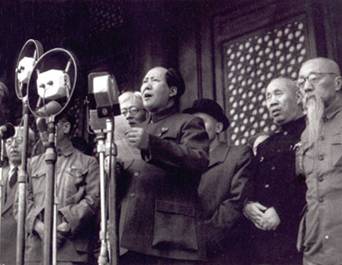On October 1st this year, it will be exactly sixty years since Chairman Mao Zedong stepped onto a rostrum on Tiananmen Square to deliver a speech that would change China forever. The People's Republic was born, Chiang Kai-Shek's Nationalists had been banished to Taiwan, and a new era had begun.

Photo: Wikimedia
As with any anniversary in China, the celebrations next month will be spectacular. The festivities are sure to put the ‘party' into Communist Party, as six decades of the PRC are commemorated in full Technicolor. The same team which was responsible for the Olympic opening and closing ceremonies has been drafted in, led by Zhang Heping, to make sure things go with a bang… but the right sort. Security measures so far have been extravagant (some might say over the top): elite forces are being trained to deal with shootings, terrorist bombs, chemical attacks, and hijackings, and surveillance is in effect from Inner Mongolia to Hebei Province. Security surrounding the celebrations is even tougher than for the Beijing Olympics last year, so the government is clearly watching its back. In light of the recent activity in Xinjiang Province, the chances are that they're afraid of some sort of internal uprising. But threats from outside of China are felt too – apparently, recent foreign arrivals to Beijing are being observed.
We've heard and read a lot about this stringent security in the press lately, but what do we actually know about the festivities themselves?
This year's Mid-Autumn Festival, or Golden Week, is to be extended, making a double holiday. The festivities will centre on Beijing, with the main events taking place around Tiananmen Square and Chang'an Avenue. Many of the capital's streets, including Chang'an, have been specially widened for the parade, allowing a cavalcade of tanks, armoured vehicles, missiles, and a whole panoply of weapons to pass along it. This display by the People's Liberation Army will be the largest military parade in Chinese history. Some people are unsure that a display of war is the best way to celebrate "harmonious" China, and others believe it to be a ridiculous waste of money, especially when countless Chinese are still living in poverty.
Then there's the general street parade. In October last year, 12 months before the anniversary, the organising committee started a recruitment drive for women aged 17 to 25, measuring between 5'3" and 5'7" to be part of the parade. Rehearsals began in December in a specially built training village in the suburbs of Beijing. These women will make up some of the 12,000 performers who will march. The parade is being choreographed by film director Zhang Yimou, who oversaw the Olympic opening ceremony last year.
While this large-scale show of patriotism is typically Chinese, Westerners tend to see things differently. Zachary, an English expat who has been living in Beijing since 2006, says, "It's kind of tiring, this whole celebration… especially after the Olympic brouhaha last year. I think westerners, especially the English, have a different view of patriotism than the Chinese; to me, this sort of event is grotesque, and kind of jingoistic."
Zachary probably won't be watching "The Great Cause of China's Foundation", then… This propagandist movie is the work of the China Film Group, and is directed by Huang Jianxin. Actor Tang Guoqing takes on the illustrious role of Chairman Mao, while Zhang Guoli steps into the shoes of the villainous Chiang Kai-Shek. Everyone involved in the production has taken home a reduced salary just for the privilege of appearing in the epic. According to the China Film Group's big boss, Han Sanping, the film has "the most powerful lineup in the history of Chinese film".
It forms the centrepiece of a 40-strong selection of movies to be broadcast throughout October, along with such seminal titles as "Tiananmen" and "The Message". Rural folk will have a chance to see the movies over Spring Festival when they will be broadcast across the nation. This film extravaganza is set to bring in between ¥800 million and ¥1 billion.
The commemoration has a logo as well as parades and a movie gala, as any decent commemoration should. Unlike the fun-filled fuwa of the 2008 Games, or the Shanghai Expo's Haibao, the anniversary's logo is a rather retro-looking red ‘60' encasing a miniature yellow Forbidden City silhouette.
So with the eyes of the world on China for the second time in two years, will the government be able to prove that they are a real force to be reckoned with culturally, or just a one trick pony? It's very commendable to light fireworks and organise parades, but the most important issue is whether China can learn from the mistakes of the Republic's first 60 years, and build on its successes.
***
Related Links
Beijing police anti-terror patrols for anniversary
China's 60th Anniversary: Newest Visa Info
China plans harsh security for 60th anniversary
Warning:The use of any news and articles published on eChinacities.com without written permission from eChinacities.com constitutes copyright infringement, and legal action can be taken.
All comments are subject to moderation by eChinacities.com staff. Because we wish to encourage healthy and productive dialogue we ask that all comments remain polite, free of profanity or name calling, and relevant to the original post and subsequent discussion. Comments will not be deleted because of the viewpoints they express, only if the mode of expression itself is inappropriate.
Please login to add a comment. Click here to login immediately.